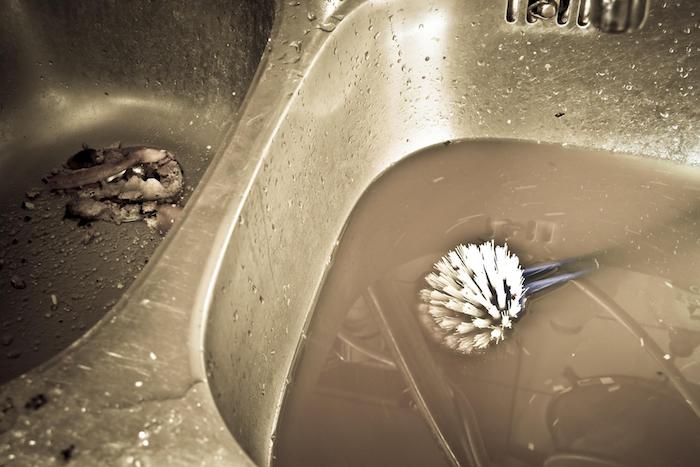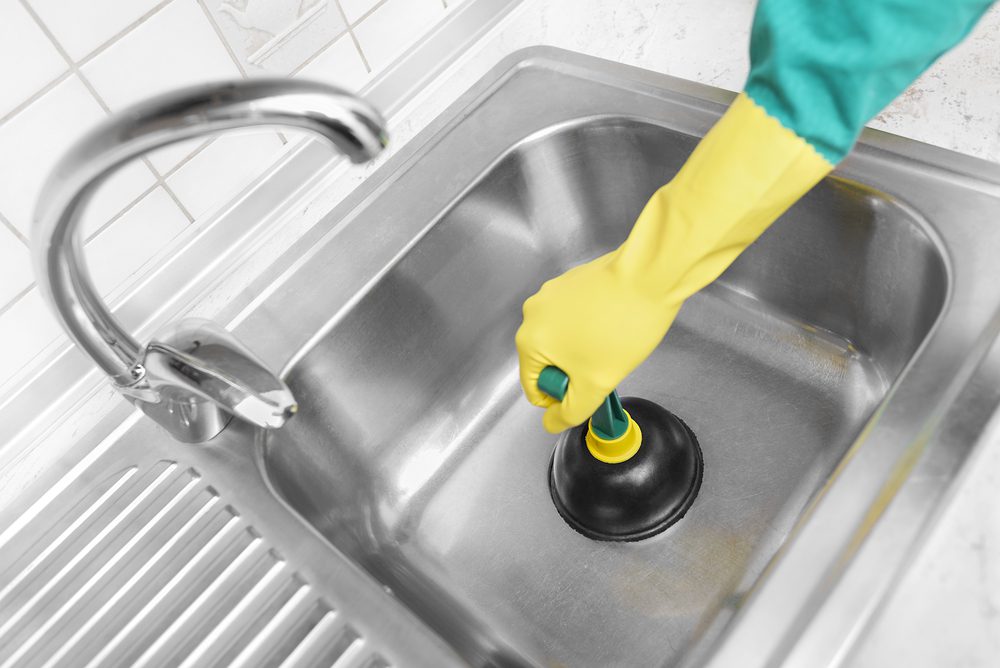We've encountered this article relating to 7 Ways To Fix A Slow-Draining Sink Before You Call A Plumber down the page on the web and decided it made good sense to relate it with you on this site.

Intro
We have actually all been there: You're cleaning your teeth or cleaning your hands, and you observe the water pooling in the sink. As opposed to promptly swirling down the drain, it lingers, transforming your once-refreshing morning regimen right into a miniature overload scene. A slow-draining sink isn't just annoying; it's commonly an indicator of larger plumbing problems prowling beneath the surface. Fortunately is that a lot of slow-draining sinks can be fixed with a little expertise, a few basic tools, and some patience. Ready to tackle this task head-on? Let's roll up our sleeves and dive right in.
Recognizing the Sources Of a Slow-Draining Sink
Before you start poking around in your pipes, it helps to know what may be causing the slowdown. Comprehending the source makes it simpler to choose the appropriate fix.
Devices and Materials You'll Require
The right devices make all the difference. Fortunately, you won't require a completely stocked plumbing professional's van to finish the job.
Step-by-Step Overview to Taking Care Of a Slow-Draining Sink
Currently, allow's get involved in the nitty-gritty. This step-by-step process will assist you via simple techniques to restore your sink's drainage.
Action 1: Get Rid Of and Tidy the Stopper
Typically, the stopper (that small plug you lower to block water) is the very first culprit. Remove it meticulously and wipe any kind of hair or gunk trapped around its base. Rinse it extensively before putting it back in position.
Step 2: Use a Plunger to Displace Particles
Got that bettor ready? Setting it over the drain and offer it a few firm pumps. The idea is to produce suction that can loosen any kind of clog. If you see bits of debris drifting up, you get on the best track.
Action 3: Attempt a Drainpipe Serpent or Cord Wall Mount
If the bettor does not suffice, it's time to highlight the drainpipe serpent. Delicately feed it right into the drain and twist as you go. You might really feel some resistance-- that's most likely the blockage. Keep twisting and pulling till you eliminate the obstruction. If you don't have a drainpipe snake, a straightened out cord wall mount can work in a pinch.
Step 4: Apply a Do It Yourself Drainpipe Cleaner
A natural cleaner made from cooking soft drink and vinegar can break down residual gunk. Pour half a cup of cooking soda into the drain, adhered to by half a cup of vinegar. Allow it fizz for about 15 minutes, after that flush with warm water. This chain reaction frequently does wonders for small obstructions.
Tip 5: Reassemble and Examine the Sink
Placed whatever back together and run the faucet. Does the water currently swirl away at a reputable speed? If yes, provide on your own a pat on the back. If not, do not anguish-- there are still a couple of more tricks up your sleeve.
Necessary Devices for DIY Repairs
A bettor is your go-to beginning factor. A tiny, sink-sized plunger develops suction that can dislodge small obstructions. For even more relentless blockages, a drainpipe serpent (occasionally called a plumber's auger) functions wonders. A set of handwear covers, a flashlight, and maybe a set of protective safety glasses are likewise useful.
Recommended Cleaning Solutions
Light meal soap and warm water can assist break down oily build-up. A mixture of baking soft drink and vinegar is a tried and true home remedy, and chemical cleansers offer a more environmentally friendly method. Maintain chemical drain cleansers as a last resource, as they can be rough on your pipes.
Usual Perpetrators Behind Slow Drainage
So, what's blocking things up? Commonly, it's a combination of everyday debris-- believe hair, soap residue, tooth paste residue, and leftover food bits. Gradually, these tiny bits build up and cling to the pipe wall surfaces, progressively tightening the passage and making it harder for water to travel through. Sometimes, mineral deposits from hard water can also include in the substance, creating the excellent storm for persistent blockages.
When is it Time to Do Something About It?
If you observe the water draining slower than normal, it's a good idea to interfere quicker rather than later. Waiting too long can bring about complete blockages, undesirable odors, or perhaps pipe damages. If the water takes greater than a few seconds to remove after shutting off the faucet, consider it a warning and get ready to put on your DIY hat.
Safety And Security First: Precautions and Preparations
Before you launch into unclogging mode, think of safety and security. You're handling potentially filthy water and debris, so slip on a pair of handwear covers. If you're utilizing chemical cleaners, make sure the space is well-ventilated and follow the instructions on the tag.
Protective Equipment and Office Arrangement
Lay down some old towels or cloths around the sink location to catch dashes. Eliminate any type of things that might enter your means, like soap dispensers or toothbrush holders. See to it you have good lights-- grab a flashlight if needed.
Alternate Approaches for Stubborn Clogs
Not all blockages are produced equivalent. If your sink still rejects to coordinate, consider these different services.
Sodium Bicarbonate and Vinegar Method
We already touched on this, however it deserves keeping in mind once more. This gentle, environment-friendly technique is more secure than chemical cleansers and frequently quite efficient.
Enzymatic Drain Cleansers
Enzyme-based cleansers utilize natural bacteria to digest raw material. They're a superb selection if you're aiming to prevent severe chemicals. Simply bear in mind, they might take a bit longer to function their magic.
Chemical Drain Cleaners: Advantages And Disadvantages
Chemical cleaners can blast with hard clogs quickly, but they're not without downsides. They can produce warmth and fumes, damage pipelines if used exceedingly, and pose ecological threats. Use them sparingly, and always adhere to the directions very carefully.
Safety Nets to Keep Your Sink Flowing
Prevention is the best cure. By embracing a couple of straightforward habits, you can keep your sink from slowing down in the first place.
Regular Cleaning Routines
Clean down the sink basin and fixture area routinely. Remove hair or food particles before they have an opportunity to wash down the drainpipe.
Preventing Hazardous Substances Down The Tubes
Reconsider prior to dumping coffee premises, oil, or fibrous veggie scraps down the sink. These wrongdoers cling to pipeline walls, creating blockages with time.
Routine Maintenance Checks
Schedule a fast month-to-month assessment. Run warm water with the sink for a few mins, taking notice of the flow. If it appears slow, act fast prior to it comes to be a full-blown blockage.
When to Call a Specialist Plumbing Technician
Sometimes, regardless of just how hard you try, that obstruct simply will not move. That's when it's time to bring in the pros.
Signs That Indicate a More Major Problem
If your sink drains slowly in spite of numerous efforts, or if you observe water backing up in various other fixtures (like your shower or bathroom), you may have a more major plumbing problem hiding deeper in the system.
Stabilizing DIY Efforts with Specialist Help
While do it yourself can conserve you money and use a sense of accomplishment, there's no embarassment in calling a specialist. An expert plumbing technician can evaluate your whole plumbing arrangement, making certain there's no underlying damage or lasting problem that might cost you more later on.
Comparing Expenses and Long-Term Solutions
Prior to deciding, consider the big picture. An economical, quick fix might resolve the issue momentarily, yet purchasing a much more irreversible remedy could save you money and tension over time.
Evaluating the Expenditures of DIY vs. Expert Fixes
DIY solutions usually cost bit more than the cost of a plunger or a container of baking soda. Specialist solutions, on the other hand, come with a price tag however may prevent repetitive problems and pricey repair work later on.
Buying Quality Fixtures and Upgrades
If your sink's style contributes to constant clogs, it might be worth updating to higher-quality components or modifying the plumbing layout. Consider this a financial investment in your house's performance and convenience.
Conclusion
A slow-draining sink can seem like a small inflammation, but it's commonly a sign that your pipes needs a little tender loving care. By comprehending the root causes, using the right tools and methods, and dedicating to simple preventive measures, you can maintain your sink flowing easily. And when all else stops working, never think twice to call in an expert-- your home's plumbing deserves the financial investment in care and maintenance.
Three Common Ways to Fix a Slow Drain
Baking Soda Method
Boil a full pot of water. Measure out cup of baking soda and pour it down the drain. Then take cup of the magical cleansing substance known as white vinegar and drop that down there too. Allow the mixture to fizz in the drain for five minutes as the vinegar and baking soda combine. Now dump in that whole pot of boiling water. This combination of cleaning substances should clear out anything that is causing your sink to drain slowly. If it doesn t...
Zip-It
If the baking soda method doesn t clear out your drain, it may be because a significant amount of hair and/or other debris has collected there and you need to remove it. Purchase a Zip-It tool at any home improvement or hardware store and insert it into your drain. It will catch any collected hair or debris that s blocking the flow of water. Pull it out. If it s got a big clump of hair, etc. on the end, you ve probably got your culprit.
Drain Cleaner
If these methods don t work, there is the standard drain cleaner that you can also buy in a hardware store or even your local grocery store. It s better if you can use a household solution, but these drain cleaners often work in a pinch. They re very simple to use. You generally just dump them in your drain and wait. If even this method is not effective, it may be time to call the plumber.
https://www.mrrooter.com/oneida/about-us/blog/2017/july/three-common-ways-to-fix-a-slow-drain/

I hope you enjoyed our topic on Three Common Ways to Fix a Slow Drain. Thank you so much for taking time to read through our blog. Please take the opportunity to promote this blog post if you appreciated it. I treasure your readership.
Need Help? Hire Us Now!